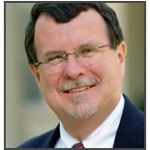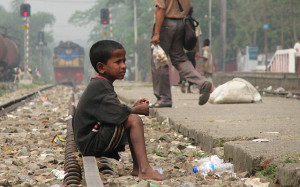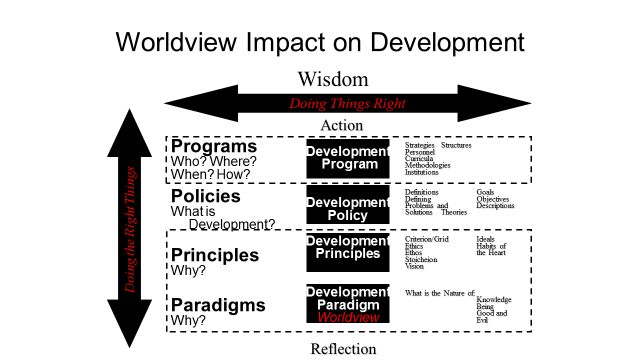In part 1, we introduced Bryant Myers’ paper, “Progressive Pentecostalism, Development, and Christian Development NGOs: A Challenge and an Opportunity“, noting especially the contrast he draws between the perspective of Western poverty fighters and African Pentecostals living in poverty. Myers accurately points out this contrast, but we suggest his analysis left unaddressed the role of the biblical worldview.
We closed part 1 as follows:
“The fact is, neither the African nor the Western view is complete. It’s a matter of ‘both and,’ not ‘either or.’ The problem comes when each underlying worldview is allowed to stand and then the two are pitted against each other.
“It is the beauty and power of the third alternative—a biblical worldview—that allows for human flourishing.”
Here’s the conclusion of our reflection.
~
 Writing about western NGOs working on problems of poverty in Africa, Dr. Bryant Meyers says, “For the churches, the best human future is being reconciled to God and loving one’s neighbor. For the secular NGO, the better human future is some form of material well-being.”
Writing about western NGOs working on problems of poverty in Africa, Dr. Bryant Meyers says, “For the churches, the best human future is being reconciled to God and loving one’s neighbor. For the secular NGO, the better human future is some form of material well-being.”
A biblical worldview would challenge this dichotomy. In the framework of the Scripture a better human future includes reconciliation with God and one’s neighbor and with the rest of creation. We were meant to flourish in all our relationships not just some of our relationships.
Myers continues:
Catholic and mainline development agency personnel often reflect their Western heritage and the view of their Western funding agencies, with the Western two-tiered spiritual/material ontology. Thus Satan, demons, and spirits are seldom mentioned. The role of the Holy Spirit is understood more as a historical or future phenomenon or is ignored altogether, except as a personal concern. The miraculous and evangelism are viewed with some concern or even suspicion. While I am sure there are exceptions, it may be the case that Catholic or mainline Protestant development agencies are not all that distinguishable from their secular international counterparts when seen from the perspective of the poor they serve.
This describes my own 27 years at an international relief and development organization. There was a continual tension between unexamined assumptions of the R&D industry, on the one hand, and, on the other, the desire to do excellent work within that framework. We were motivated by Christ to help the poor and to do our work with excellence. These are good characteristics.

We were committed to “do things right” in relationship to the way we run our programs. Those who are concerned with excellence often do program audits. But, just as often, they do not deal with the more difficult question: Is our work actually helping the poor? Does it enable people to create wealth for themselves, or does it leave them dependent on outsiders? Are we doing the right things?
Doing things right is good. But we also need to be sure that we are doing the right things. A person or organization can spend years with good intentions doing the wrong things right! This in fact leads to dependence and greater poverty. We need to be as concerned with doing the right things as in doing things right. Being concerned with doing the right things requires a “metaphysical audit.” Are our programs and policies derived from biblical principles and a biblical worldview or are they derived from an atheistic/materialistic worldview and the subsequent principles? (For more on this see our book Discipling Nations: the Power of Truth To Transform Culture.)
Good intentions are not enough. The bottom line: are people and communities flourishing?
Myers writes:
At the theological level, there appears to be a greater degree of congruence between evangelicals and Neo-Pentecostals, but this may not be reflected as fully in practice as one might hope. Evangelical NGOs usually affirm a holistic worldview that unites the spiritual and the material, since such a view is consistent with their belief in uniting evangelism and development as part of what they call the integral or holistic Gospel. Progressive Pentecostals would agree, but, I suspect, for a wider range of reasons.
I would say that for most of my years working for an evangelical NGO this was not the case. When I began, the agency was thoroughly functioning from the dominant, materialistic worldview of the industry. Later, the realization emerged that a spiritual component in the development process was needed. So this component was “added.” A director of spiritual ministries was appointed. Ministry to pastors in the communities was launched.
But physical ministry plus spiritual ministry does not equal transformational development.
Only the bold, integrative biblical worldview, which comports with reality, will serve. Some Christian R&D agencies have rejected the ineffective, materialistic worldview. They have declined to simply add a spiritual component to their work. Rather, they have begun to articulate the language of biblical worldview. This is a step in the right direction.
But without the conviction of the importance of worldview (as a concept) and the power of the biblical worldview to transform individuals, communities and nations, little will be done to reform an NGO within a biblical paradigm. Unless this worldview is applied in the area of policy and programs, there will be no lasting and transformational impact.
Poverty and worldview intersect in development work
Finally, Myers writes:
![]() For most evangelical organizations, evangelism is seen as something Christians are obligated to do but, if working in a development organization, something they need to do “sensitively,” since evangelism is a taboo issue for some of the organizations’ funders … For Progressive Pentecostals, in contrast, evangelism is central, urgent, and Spirit driven; it is considered to be the central contributor to the effectiveness of development work.
For most evangelical organizations, evangelism is seen as something Christians are obligated to do but, if working in a development organization, something they need to do “sensitively,” since evangelism is a taboo issue for some of the organizations’ funders … For Progressive Pentecostals, in contrast, evangelism is central, urgent, and Spirit driven; it is considered to be the central contributor to the effectiveness of development work.
In short, evangelical organizations are more committed to their funding sources than they are to helping people escape poverty.
For almost 25 years I heard that the funding source would not allow the staff of the organization to do evangelism. This was the excuse to remain silent. And this silence came from middle management and sometimes from the top leaders of the organization.
Here the Progressive Pentecostals Myers references are right: evangelism is fundamental contributor to development because it leads to a change in worship and can lead to a change in culture which is often critical to development.
But, I would argue that while evangelism is a fundamental factor, it is not a sufficient factor. Many people come to genuine faith in Christ without recognizing and abandoning the lies of their culture. The web of lies that enslaves the culture needs to be broken. Development will not spring from evangelism alone. It will not occur without individual lives being renewed and cultures transformed. Jesus summed it up as discipling nations.
If you are interested in poverty and development, Myers’s article will help you identify the differing schools of thought that drive the development process. More specifically, it will help you see how secularism has impacted evangelical R&D institutions and how Progressive Pentecostals offer a radically different, though not necessarily comprehensive, alternative.
- Darrow Miller
See also Thirteen Differences in Serving with Kingdom Perspective –






